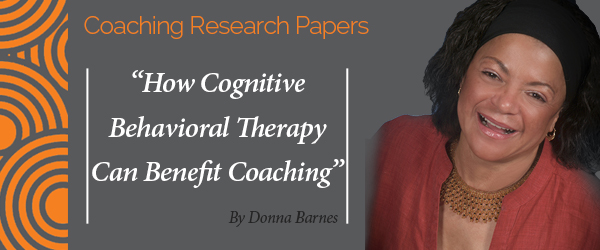Research Paper By Donna Barnes
(Loss and Healing Coaching, UNITED STATES)
Introduction:
As someone who works in the field of mental health (not as a clinician) as a trainer on how to recognize the signs when an individual needs help, it has come to my attention that clients and counselors are not always on the same page and lack connection. This bothers me because the lack of connection can sometimes mean to the person seeking help, may feel that therapy is useless. I always respond with – think of the therapist as a pair of shoes – if they do not fit find another therapist because there was obviously no chemistry. Now that I am a coaching student, I don’t think it is that simple. The purpose of this paper is to examine the research question in the above title.
Can we do a good job as a coach if there is no chemistry, no connection, no rapport…and how do we know it is due to chemistry that it is not working out? What is this chemistry thing? Is there something intangible that creates good chemistry that goes beyond tools and techniques?
For instance, I sometimes think that in order to develop good chemistry, we should start with ethnic matching. So if someone called me about their son needing a therapist or psychiatrist, I would try to find one that was male of the same ethnicity. To me the more common ground the better. If the person was young, I would search for a young therapist. When I started ICA and needed a coach, I wanted one that was around my age, black, female, and American. I felt the more common ground, the less explaining I would have to do and there would be a better understanding of me as a client.
And it would increase the chances of having good chemistry. Then, I began to think – wait a minute – I could really benefit if I had a coach who was from another country, different ethnicity, and so on because I would learn new ways of thinking. And we could learn from one another. So I chose a white female from New Zealand. Not too much of a difference since English was her first language and she was female, 10 years younger than me. However, the culture and ethnicity were different. We have become very good friends and when she finished coaching me I turned around and coached her.
Studies have shown that the more similarities, the better the compliance from patients when in therapy and the less similarities had a higher dropout rate (Hermain, SH., 1998). But are similarities and chemistry the same. I think not – but it is a start in wanting a client where there is chemistry. I would imagine that based on various studies and personal stories that chemistry is easily developed when there is more commonality.
What does not having chemistry mean?
We go into the coaching business with the thought that we can pick and choose our clients. We see no reason in trying to fit a square peg into a round hole and work with clients in which we have no chemistry.
Not having chemistry means many things to many coaches. Perhaps it means that a relationship between the client and coach is not developing well. There could be miscommunication, lack of understanding or no interest at all in the sessions by either party. Coaches and clients are human. One might not like the sound of someone voice – perhaps it is annoying to them. Have you ever heard someone’s voice that was irritating to you? Or who spoke too fast or too slow? Perhaps the person is too serious when you are lighthearted and humorous. Everyone sees the world differently and we generally have relationships with those who have like minds. If someone does not act, think or feel the way we do – we do not spend a lot of time with them.
We all know of those we cannot work with smoothly – either they demand too much, are too controlling, don’t like how you communicate with them, or are just plain irritating to the point where you want to avoid their phone calls, texts or emails. Some suggest cutting them loose and save everyone involved the hassle.
In coaching it is our job to develop and work on a relationship with our client. Make a change so that the client does not feel that we are not of like minds (Jutkins, 2010). If we want our clients to make a change – we need to step up to the plate and disarm a difficult client, move lightly into making the client feel at ease.
